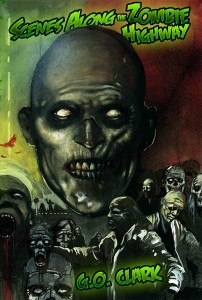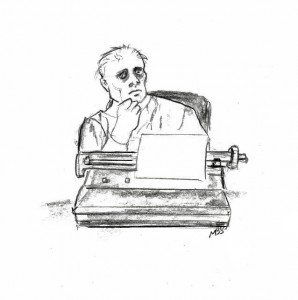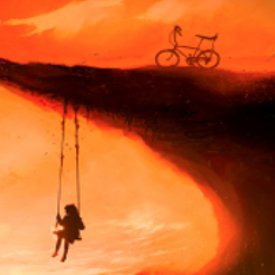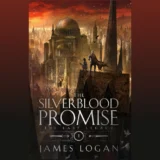Scenes from the Zombie Highway, by G. O. Clark
 G.O. Clark is a prolific genre poet. He started out writing mainstream poetry when he was in college, but says that there are seeds of genre poetry to be found in those as well. Since his first published genre poem appeared in The Magazine of Speculative Poetry in 1988 he’s published innumerable poems in a plethora of publications (many by Dark Regions Press and Sam’s Dot Publishing – now defunct), 9 poetry collections and one short story collection, and has “received some positive criticism and award recognition along the way; Asimov’s Readers Award 2001, 2nd place Rhysling Award 2001,2012, and Stoker Award final ballot 2012.”[i] His poetry has been anthologized 17 times and you can find his most recent single poems in print magazines Asimov’s (“A Work In Progress”, June 2014) and Analog (“Giant Steps”, June 2014). He has another collection – Gravedigger’s Dance, Dark Renaissance Books – forthcoming in 2014). I’ve come to “know” him as a pleasant and helpful collaborator – I’ve recorded a number of his poems for StarShipSofa and Poetry Planet over the years – despite his predilection for grisly subject matter!
G.O. Clark is a prolific genre poet. He started out writing mainstream poetry when he was in college, but says that there are seeds of genre poetry to be found in those as well. Since his first published genre poem appeared in The Magazine of Speculative Poetry in 1988 he’s published innumerable poems in a plethora of publications (many by Dark Regions Press and Sam’s Dot Publishing – now defunct), 9 poetry collections and one short story collection, and has “received some positive criticism and award recognition along the way; Asimov’s Readers Award 2001, 2nd place Rhysling Award 2001,2012, and Stoker Award final ballot 2012.”[i] His poetry has been anthologized 17 times and you can find his most recent single poems in print magazines Asimov’s (“A Work In Progress”, June 2014) and Analog (“Giant Steps”, June 2014). He has another collection – Gravedigger’s Dance, Dark Renaissance Books – forthcoming in 2014). I’ve come to “know” him as a pleasant and helpful collaborator – I’ve recorded a number of his poems for StarShipSofa and Poetry Planet over the years – despite his predilection for grisly subject matter!

Scenes Along the Zombie Highway is his most recent collection, jumping on the bandwagon of zombie enthusiasm. Internal art is by the prolific Marge Simon once more. I have to admit, I’m not a huge fan of zombies. I find the idea pretty disgusting and creepy and I don’t enjoy being grossed out. This collection, however, is not full of splatter, blood and guts (although there is plenty of gore – don’t ask me what the distinction is), so if you are looking for that kind of thrill you’d be better off looking elsewhere. Clark’s poems are first and foremost informative, then creepy, grisly and even a little bit tongue-in-cheek funny. At least that’s how they strike me.
There are many poems, which read more like news articles, instructions or could be part of a handbook on or for zombies. We have “Season of the Living Dead” to tell us how zombies behave in each season:
Come spring
the snow pack melts
and the zombies thaw out,
picking up where they left off
before the winter freeze.
Then there’s a description of the horrific “Zombiemobile”; “Clothes Make the Zombie”, describing how a zombie’s attire might give the appearance of differentiation, but zombies are zombies in the end; “Some Things Zombies Suck At”, which lists just that; “Some Advice to Prospective Zombies” (because if there’s an outbreak, isn’t everyone?); “Breaking News”; “Road Trip Advice”; “Some Zombies One Should Avoid”, which describes what a zombie politician, salesman, radio talk show zombie and others would likely do to you (and it’s not just “BRAINZ!!); and “Quotes from the Zombie Fact Book”:
“Miniature golf to zombies
is like a maze filled with once
familiar landmarks from a past
they can’t remember.”
Clark often takes one poem to describe a group or a type of “professional” turned zombie, which seems to give these zombies some personality before they go blank. We have zombie trick-or-treaters, zombie carolers, clowns, carpenters, police officers, pool partiers, members of a parade, truckers, and also our favorite cartoon characters in “Reanimated”:
Cartoon zombies
have taken over thee
towns and cities of the
real world.
…
The Flintstones,
Jetsons, Simpsons and
the Family Guy’s brood,
all real as Roger Rabbit,
 Specific individuals are also given some attention: “The Ventriloquist”; a slave/prostitute in “Zombie on a Leash”; the “Zombie Loner”, whose basic nature doesn’t change for having become a zombie (to listen to the full text of this poem and others please click on the title); a zombie priest who recreates Christ on the cross in “Scarecrow”; the novelist zombie who is losing the plot in “Writer’s Block”; the “Albino”, whose social acceptance is improved for having become a zombie (“and no longer feels like / an outsider, accepted as is”); we find out what existence has become for the little girl Jill in “Rag Doll”; we follow the progression of degradation in “The Curse of the Aware Zombie”; a zombie baseball player in the grisly scene at a game turned massacre in “Bottom of the Ninth”; a zombie whose family members are every other kind of monster in “All in the Family”; and finally “The Last Zombie”.
Specific individuals are also given some attention: “The Ventriloquist”; a slave/prostitute in “Zombie on a Leash”; the “Zombie Loner”, whose basic nature doesn’t change for having become a zombie (to listen to the full text of this poem and others please click on the title); a zombie priest who recreates Christ on the cross in “Scarecrow”; the novelist zombie who is losing the plot in “Writer’s Block”; the “Albino”, whose social acceptance is improved for having become a zombie (“and no longer feels like / an outsider, accepted as is”); we find out what existence has become for the little girl Jill in “Rag Doll”; we follow the progression of degradation in “The Curse of the Aware Zombie”; a zombie baseball player in the grisly scene at a game turned massacre in “Bottom of the Ninth”; a zombie whose family members are every other kind of monster in “All in the Family”; and finally “The Last Zombie”.
The (still) living don’t feature very often, but when they do, it’s quite chilling. They remain nameless, these people in hiding, who are being pursued or who are about to become victims, and thus these poems pack a punch as we identify or empathize with them. In “At the Tipping Point” we look on as someone in a café witnesses one of the first zombie attacks, not having recognized the ragged person as such. The little girl, whose parents have disappeared and who is hiding in her home hoping the zombies don’t find her, is every mother’s worst nightmare (“Playtime’s Over”); we witness the attack on the TV crew in “Breaking News”; We feel a man’s regret that he couldn’t perform the final merciful act for his “Old Flame”; and the rush of adrenalin as we accompany a driver with a zombie semi trucker in hot pursuit. I think these are Clark’s best and most successful poems in this collection. They are denser, less superficial and illicit real terror.
You might think that a collection of poetry featuring only zombies might be a bit monochrome. Sure, this is a quick read, mostly entertaining if you like this sort of thing, but it is definitely not boring! The juxtaposition of humorous with chilling keeps your brain engaged throughout, but it won’t keep you awake at night.
* * *
In a fortnight I’ll be doing another Poetry Round-up for your one-stop genre poetry fix. See you then!
[i] From his website’s bibliography.










